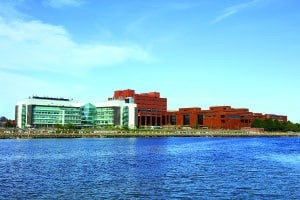By all means, proud but beleaguered UMass Boston should take up Mayor Marty Walsh’s offer to sit on the search committee for the university’s next chancellor when the hunt for a new leader resumes.
But UMass Boston’s spunky faculty, which just bravely – and rather recklessly – torpedoed the most recent search process by publicly dissing the qualifications of the three finalists, should threaten to resign before they let Boston City Hall take over the state university and its harborside campus in Dorchester.
It’s not that Walsh is a bad guy – far from it. However, if UMass Boston supporters believe the urban university is getting a raw deal as the poor stepchild of the statewide UMass system, just wait until every two-bit city councilor gets to call the shots.
The dangers of entrusting an institution of higher education to the tender mercies of hometown pols can be seen in the travails of long-suffering Quincy College. The president of the city-owned college, founded in the 1950s, recently resigned, and for good reason, after a state shutdown of the college’s core nursing program, which left more than 250 students stranded.
The Board of Education in Nursing based its decision on the poor performance by Quincy College graduates on the state licensing exam, not meeting curriculum standards and high administrative turnover, the Boston Globe reports.
When it comes to controversy and questionable standards, let’s just say this isn’t Quincy College’s first rodeo.
Inspired by the latest mess at the two-year college, I dug up an in-depth piece I wrote on Quincy College two decades ago – and it wasn’t a puff piece on its academic prowess. Rather, the college stood out for its close ties to Quincy’s political establishment and rampant patronage, with political donations a prerequisite to landing top administrative and teaching jobs.
Just take the college’s enrollment director at the time, whose main qualifications were a $200 donation to the political campaign of a top college official, himself a city pol. That is unless you could count the enrollment director’s previous job as a laborer for the city housing authority as relevant to his new job.
Instead of being run for the benefit of its students, the college served as a giant jobs bank for mayors, city councilors and school board members.
“It’s a patronage machine,” one faculty member told me at the time.
This unusual way of running an institution of higher education worked about as well as you would think it would. Not surprisingly, falling enrollment and financial mismanagement led to layoffs and concerns about the college’s ongoing viability.
Quincy College obviously managed to survive that late 1990s crisis. But given the debacle of the shutdown of its nursing program, seemingly not much has changed.
There Can Only Be One
And what of UMass Boston? Quincy College’s sorry example should make even the most misguided and naïve supporters of a City Hall takeover of the university think twice.
Yes, when it comes to the overall UMass system, the game is rigged against its Boston campus. By virtue of its location and urban mission, UMass Boston has tremendous potential to become a quasi-flagship campus for our state’s public higher education system, one with a national reputation of its own.
But in a state where support for public higher education has never been as strong as it should be, there’s room for only one flagship campus, and that’s Amherst, as its recent acquisition of Mount Ida College demonstrates.
Taking UMass Boston away from state control and turning it over to Boston City Hall would be the equivalent of jumping from the frying pan right into the fire.
With UMass Boston under city control you won’t have to wait long before former city councilors wind up in plum administrative jobs or holding forth in the classroom. Then there will be all those nameless back-office jobs that various city pols can dole out to their supporters.
Who knows, we might even end up with a Marty Walsh Center for Public Leadership, though, to his credit, that kind of grasping glorification doesn’t seem to be Walsh’s style.
Still, an unscrupulous successor might have fewer qualms.
As an alum (class of 1990), I wish there was a way to provide UMass Boston with a measure of financial and political independence that would allow the university to achieve its true potential. That said, I am not sure what that would look like or even if it’s possible, given the sad realities of Massachusetts politics.
What’s the right course for UMass Boston’s future? I’ll be damned if I know. But it sure isn’t making the university a plaything for various and sundry Boston pols.
Scott Van Voorhis is Banker & Tradesman’s columnist; opinions expressed are his own. He may be reached at sbvanvoorhis@hotmail.com.




 |
| 
